今から約5分前に発見して椅子からコロげ落ちそうになりました。
な。な。な(言葉が出ない)
「沈黙している」のは真紀子先生かと。てっきりわたくし思って
おりましたが。はい。そういうワケではなかったのでございます
ね。しかし何でまた突然『Taipei Times』に登場するのか。
んー。Taipei Timesは、自由時報の姉妹紙とは言え、特に本土派
紙ではないと思います。台湾にそういうメディアがあるかどうか
不明でございますが、強いて「中立紙」というものが存在すると
すれば、Taipei Timesぐらいか。論説(同紙では「Editorials」
と表記)欄が若干本土派寄りの傾向があるぐらい...なのだが
よりによってその論説欄に載っているのであった。
ニュースじゃねんだから他の欄に載せようがないが、しかし何で
また突然(振り出しに戻る) 自由時報も時々馬英九台北市長の
論文載せてるが同じようなモノか?(一緒にすな)
---
Japan must end its silence/田中真紀子
(Taipei Times 2003.03.10 Editorials)
http://www.taipeitimes.com/News/edit/archives/2003/03/10/197489
With the Japanese government delivering wishy-washy responses to the Iraq crisis, it's time for officials to approach the debate over national security with more maturity
By Makiko Tanaka
Monday, Mar 10, 2003,Page 9
A recent opinion poll in Japan shows that 68 percent of Japanese believe that the US and Britain should not attack Iraq. Yet, in debates in the Diet, our parliament, neither Japanese Prime Minister Junichiro Koizumi nor the foreign minister utter anything more than such tepid responses as: "Japan cannot respond to a hypothetical situation;" or "Japan cannot take a definitive stance without assessing the results of the inspections;" and "It is in Japan's national interest not to declare whether or not it supports the use of force."
But Japan can no longer afford to be silent or vague about growing global insecurity, as the crisis next door on the Korean Peninsula demonstrates.
Why is Japan so seemingly detached in international affairs? Japan has relied entirely on the US for its security needs for over fifty years and the Japanese government essentially believes that it has no option but to agree with the US or to keep silent.
Avoiding debate
Indeed, since the end of World War II, Japan has avoided a full-fledged debate on the country's national security framework, in which Japan would have the courage to disagree with the US.
Of course, most Japanese politicians, media commentators and academics understand the need for this stance, and the Japanese trait of putting a lid on troublesome issues reinforces this silence, compounding all problems in foreign policy.
But at times like these, when issues such as North Korea's bid to acquire nuclear weapons and a possible US-led war against Iraq provoke heated debate in the international community, the Japanese public is also engaged in frequent, daily exchanges about what Japan should do.
It is only the government that steadfastly refuses to intervene in the debate or propose any action. Criticizing Japan's silence need not undermine the Japanese-US strategic alliance.
Only last year the two countries commemorated the 50th anniversary of the signing of the US-Japan Security Treaty.
During those 50 years, however, the map of world conflict has been rewritten and the means of warfare transformed, while Japan remains locked in viewpoints forged in the trauma of wartime defeat and US occupation.
There is another factor at work, too. Japan's "Peace Constitution" supposedly bans possession of military forces. As a party to Japan's debate on national security, I know from experience that attempting to clarify the vague constitutional status of our Self Defense Forces would lead China and South Korea -- victims of past Japanese invasions -- to use dissenting voices within Japan to smother all discussion, killing mature debate.
But Japan urgently needs such a debate if it is to respond to a world exposed to the threat of terrorism and gripped by fear. The terrorist attacks of Sept. 11 and recent statements by CIA Director George Tenet that North Korea possesses missiles capable of reaching the US West Coast undoubtedly shocked Americans out of their complacency over North Korea's nuclear status. But what can shake Japan's political class out of its silence?
Oil dependence
Japan's dependence on imported Middle Eastern oil also demands that we understand what a war against Iraq might mean. If Iraq's oil fields are destroyed or the war is prolonged, surging oil prices will hit Japan and the world economy hard. The best way to avoid this risk is for Iraq to raise its level of cooperation towards the inspections unconditionally and show all the proof needed to dispel the allegations leveled against it. Japan ought to speak up and say this.
Japan also can directly assist in resolving the North Korea crisis by acting as a facilitator, encouraging Russian President Vladimir Putin -- in concert with Japan, South Korea and China -- to initiate negotiations with North Korea's Kim Jong Il. Putin enjoys a relationship of trust with Kim and thus may be able to persuade him that only by abiding by international law will he ensure his country's future and that this, indeed, is the only option left open to him.
But Putin needs to be convinced to take the lead. His hope for better relations with Japan gives Japan's leaders leeway to nudge him in this direction.
Strong support
Undoubtedly, most Japanese strongly support the US-Japan alliance. While unequivocally commending America's tough stance in pressuring Iraq, Japan should not hesitate to deliver a clear message to the US -- exercise patience to avoid war.
But Japan's government also must stop prevaricating with the Japanese people -- it should welcome and encourage debate about Japan's defense posture, without fearing that the US-Japan friendship is so fragile that it will be destroyed.
The benefits and burdens of international affairs must become subjects of open debate in the Diet.
A clear statement from the government, now rather than later, on what contribution Japan would make to any post-war reconstruction effort in Iraq is needed.
Japan must avoid repeating the unseemly scenario following Iraqi President Saddam Hussein's defeat in the Gulf War of 1991, when it wrote large checks to cover the war's costs, yet had no say in the war's conduct or war aims. Transparency of this kind is needed if Japan is to make a stronger contribution to world affairs and help prevent the 21st century from becoming yet another century of war.
Makiko Tanaka is a former foreign minister of Japan. Copyright: Project Syndicate
な。な。な(言葉が出ない)
「沈黙している」のは真紀子先生かと。てっきりわたくし思って
おりましたが。はい。そういうワケではなかったのでございます
ね。しかし何でまた突然『Taipei Times』に登場するのか。
んー。Taipei Timesは、自由時報の姉妹紙とは言え、特に本土派
紙ではないと思います。台湾にそういうメディアがあるかどうか
不明でございますが、強いて「中立紙」というものが存在すると
すれば、Taipei Timesぐらいか。論説(同紙では「Editorials」
と表記)欄が若干本土派寄りの傾向があるぐらい...なのだが
よりによってその論説欄に載っているのであった。
ニュースじゃねんだから他の欄に載せようがないが、しかし何で
また突然(振り出しに戻る) 自由時報も時々馬英九台北市長の
論文載せてるが同じようなモノか?(一緒にすな)
---
Japan must end its silence/田中真紀子
(Taipei Times 2003.03.10 Editorials)
http://www.taipeitimes.com/News/edit/archives/2003/03/10/197489
With the Japanese government delivering wishy-washy responses to the Iraq crisis, it's time for officials to approach the debate over national security with more maturity
By Makiko Tanaka
Monday, Mar 10, 2003,Page 9
A recent opinion poll in Japan shows that 68 percent of Japanese believe that the US and Britain should not attack Iraq. Yet, in debates in the Diet, our parliament, neither Japanese Prime Minister Junichiro Koizumi nor the foreign minister utter anything more than such tepid responses as: "Japan cannot respond to a hypothetical situation;" or "Japan cannot take a definitive stance without assessing the results of the inspections;" and "It is in Japan's national interest not to declare whether or not it supports the use of force."
But Japan can no longer afford to be silent or vague about growing global insecurity, as the crisis next door on the Korean Peninsula demonstrates.
Why is Japan so seemingly detached in international affairs? Japan has relied entirely on the US for its security needs for over fifty years and the Japanese government essentially believes that it has no option but to agree with the US or to keep silent.
Avoiding debate
Indeed, since the end of World War II, Japan has avoided a full-fledged debate on the country's national security framework, in which Japan would have the courage to disagree with the US.
Of course, most Japanese politicians, media commentators and academics understand the need for this stance, and the Japanese trait of putting a lid on troublesome issues reinforces this silence, compounding all problems in foreign policy.
But at times like these, when issues such as North Korea's bid to acquire nuclear weapons and a possible US-led war against Iraq provoke heated debate in the international community, the Japanese public is also engaged in frequent, daily exchanges about what Japan should do.
It is only the government that steadfastly refuses to intervene in the debate or propose any action. Criticizing Japan's silence need not undermine the Japanese-US strategic alliance.
Only last year the two countries commemorated the 50th anniversary of the signing of the US-Japan Security Treaty.
During those 50 years, however, the map of world conflict has been rewritten and the means of warfare transformed, while Japan remains locked in viewpoints forged in the trauma of wartime defeat and US occupation.
There is another factor at work, too. Japan's "Peace Constitution" supposedly bans possession of military forces. As a party to Japan's debate on national security, I know from experience that attempting to clarify the vague constitutional status of our Self Defense Forces would lead China and South Korea -- victims of past Japanese invasions -- to use dissenting voices within Japan to smother all discussion, killing mature debate.
But Japan urgently needs such a debate if it is to respond to a world exposed to the threat of terrorism and gripped by fear. The terrorist attacks of Sept. 11 and recent statements by CIA Director George Tenet that North Korea possesses missiles capable of reaching the US West Coast undoubtedly shocked Americans out of their complacency over North Korea's nuclear status. But what can shake Japan's political class out of its silence?
Oil dependence
Japan's dependence on imported Middle Eastern oil also demands that we understand what a war against Iraq might mean. If Iraq's oil fields are destroyed or the war is prolonged, surging oil prices will hit Japan and the world economy hard. The best way to avoid this risk is for Iraq to raise its level of cooperation towards the inspections unconditionally and show all the proof needed to dispel the allegations leveled against it. Japan ought to speak up and say this.
Japan also can directly assist in resolving the North Korea crisis by acting as a facilitator, encouraging Russian President Vladimir Putin -- in concert with Japan, South Korea and China -- to initiate negotiations with North Korea's Kim Jong Il. Putin enjoys a relationship of trust with Kim and thus may be able to persuade him that only by abiding by international law will he ensure his country's future and that this, indeed, is the only option left open to him.
But Putin needs to be convinced to take the lead. His hope for better relations with Japan gives Japan's leaders leeway to nudge him in this direction.
Strong support
Undoubtedly, most Japanese strongly support the US-Japan alliance. While unequivocally commending America's tough stance in pressuring Iraq, Japan should not hesitate to deliver a clear message to the US -- exercise patience to avoid war.
But Japan's government also must stop prevaricating with the Japanese people -- it should welcome and encourage debate about Japan's defense posture, without fearing that the US-Japan friendship is so fragile that it will be destroyed.
The benefits and burdens of international affairs must become subjects of open debate in the Diet.
A clear statement from the government, now rather than later, on what contribution Japan would make to any post-war reconstruction effort in Iraq is needed.
Japan must avoid repeating the unseemly scenario following Iraqi President Saddam Hussein's defeat in the Gulf War of 1991, when it wrote large checks to cover the war's costs, yet had no say in the war's conduct or war aims. Transparency of this kind is needed if Japan is to make a stronger contribution to world affairs and help prevent the 21st century from becoming yet another century of war.
Makiko Tanaka is a former foreign minister of Japan. Copyright: Project Syndicate










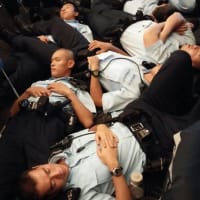

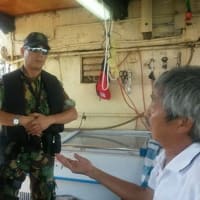

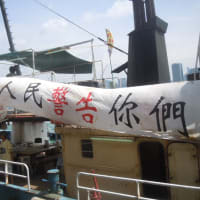
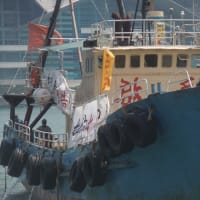
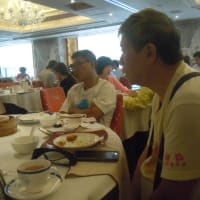

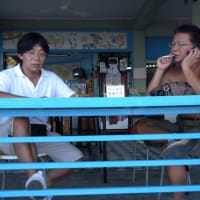
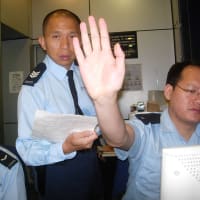
わたくしがホームページに収録した記憶があるのは
例の大前(中華連邦とは無関係)と早田健文『台湾
通信』編集長(まだあるのかアレ?) まだいたか
も知れんけど、知らない。忘れた(すぐ飽きる)
Don't drag Japan into unification controversy/早田健文
(Taipei Times 2002.10.30 Editorials)
http://www.taipeitimes.com/news/2002/10/30/story/0000177647
Rethinking relations with Japan/早田健文
(Taipei Times 2002.11.07 Editorials)
http://www.taipeitimes.com/News/front/archives/2002/11/07/178670
Capitalism with a Chinese flavor/大前研一
(Taipei Times 2002.11.07 Editorials)
http://www.taipeitimes.com/News/front/archives/2002/11/07/178671
この二人も見た時に「...」と思っていたのだが
田中真紀子の衝撃...なんで...ぐるぐるぐる。
尚、台湾(と靖国と尖閣)をこよなく愛する割には
中文オタク?の台湾研究フォーラム永山氏はたまに
自由時報の「自由廣場」に載ってます。負けるな!
亨ちゃん。